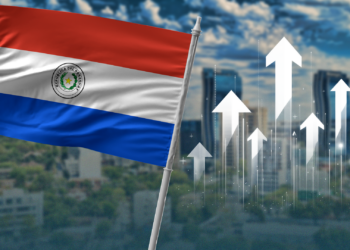Pope Francis, the first pontiff from the Americas and a noted social reformer within the Roman Catholic church, has died at the age of 88, the Vatican announced early Monday.
“Dearest brothers and sisters, with deep sorrow I must announce the death of our Holy Father Francis,” the Vatican said in a statement, according to Sky News.
“At 7:35 a.m. this morning, the Bishop of Rome, Francis, returned to the house of the Father. His entire life was dedicated to the service of the Lord and His Church.
“He taught us to live the values of the Gospel with fidelity, courage and universal love, especially in favor of the poorest and most marginalized,” the statement continued.
“With immense gratitude for his example as a true disciple of the Lord Jesus, we commend the soul of Pope Francis to the infinite merciful love of the One and Triune God.”
The pope had been in and out of the hospital in recent months with respiratory issues. He last appeared on Sunday in a wheelchair on the balcony of St. Peter’s Basilica in the Vatican, waving and wishing the crowd a “happy Easter,” according to The New York Times.
Pope Francis also met with Vice President J.D. Vance, a Catholic, earlier in the day. The visit was described by Vatican officials as “brief.”
In a post on X, Vance said that he “was happy to see him yesterday, though he was obviously very ill.”
“My heart goes out to the millions of Christians all over the world who loved him,” he added.
I just learned of the passing of Pope Francis. My heart goes out to the millions of Christians all over the world who loved him.
I was happy to see him yesterday, though he was obviously very ill. But I’ll always remember him for the below homily he gave in the very early days…
— JD Vance (@JDVance) April 21, 2025
Pope Francis’ death brings to an end a 12-year papacy marked by enormous change and controversy within the Catholic church.
Born Jorge Mario Bergoglio in Buenos Aires, Argentina, the future pope was initially ordained as an archbishop in 1969. A Jesuit — the first Jesuit to become pope — his relationship with the Society of Jesus was strained in the early 1990s, and he was given a post in an outlying Argentine city. According to the National Catholic Register, Bergolio called this “a time of great interior crisis.”
In 1998, he became the Archbishop of Buenos Aires, and in 2001, Pope John Paul II made him a cardinal. He was originally considered one of the front-runners to replace John Paul II upon his death in 2005, with reports naming him as the third-runner up in the conclave balloting.
However, when his predecessor, Pope Benedict XVI, resigned in 2013, the conclave named Bergolio the next leader of the Roman Catholic church — the first pope from the Americas and from the Southern Hemisphere.
Francis’ papacy was marked by the pontiff’s attempts to liberalize the church on social issues and to grapple with the sexual abuse scandal that had rocked the church and its authority in the 21st century.
Francis loosened the ban on divorced couples receiving Communion and supported same-sex civil unions. He also signaled a tentative acceptance of LGBT lifestyles, telling reporters in 2024, “If a person is gay and seeks God and has good will, who am I to judge them?”
However, as Sky News noted, he would come under attack from LGBT groups later in the same year for using an Italian-language gay slur during a closed-door meeting.
“Conservatives, including some cardinals and bishops, complained that the pope was blurring the lines on doctrine and even trying to change it,” The Wall Street Journal noted. “They also feared he would loosen the traditional celibacy requirement for Roman Catholic priests, though in 2020 he surprised most observers by deciding not to do so.”
Francis would also greatly restrict the celebration of the traditional Latin Mass in a move that was seen as a shot at conservatives within the church.
Following the 2023 decision, Francis called the celebration of the traditional rite a “reaction against the modern” and “backwardness,” adding that it was “a nostalgic disease.”
However, perhaps no issue so defined Francis’ papacy as the clergy sexual abuse scandal and how the pontiff reacted to it.
“Francis hardly mentioned the topic in the first year of his papacy. When he did set up an advisory body on child protection that included former victims of abuse, he didn’t act on any of its principal recommendations, including creating a special tribunal to judge bishops who abused or covered up abuse,” the Journal noted.
“Bishops in the U.S. and a handful of other countries urged him to adopt their practice of permanently barring abusers from serving as priests across the whole church. Instead, he established a board that reduced the sentences of a large minority of abusers to periods as short as three years, reversing the policy of the previous pope.”
The pope also came under fire for allegedly ignoring accusations of sexual misconduct against former Cardinal Theodore McCarrick, who became an adviser to and emissary for Francis after he retired as archbishop of Washington, D.C.
In 2018, a torrent of allegations of sexual assault and grooming against McCarrick spanning decades became public; in June 2018, Pope Francis ordered McCarrick to serve a “life of prayer and penance” in seclusion and accepted his resignation from the College of Cardinals. He was eventually defrocked after a canonical trial found him guilty of abusing both minors and adult seminarians. McCarrick died earlier this month.
Francis had been ill for the last few years of his life, needing a wheelchair or a cane to get around on most occasions. Adding to his respiratory issues was the fact that, as a young man, he had part of one of his lungs removed.
There had been hints as early as 2022 that he might step down. Those rumors intensified earlier this year when he was hospitalized in critical condition, with what was initially called “a long asthmatic respiratory crisis” but which deepened into pneumonia and required a considerable time of convalescence and recovery.
The possibility of stepping aside due to his illness and frailty was considered a possibility in the months leading up to his death. Francis himself had previously praised his predecessor for “opening the door” for papal resignation. “It was such a very good thing for the church,” he said. “He told popes to stop in time.”
While it’s unclear when the papal conclave to select the new head of the Roman Catholic church will begin, the process generally takes place between 15 to 20 days after the death or abdication of a pope.
Advertise with The Western Journal and reach millions of highly engaged readers, while supporting our work. Advertise Today.








